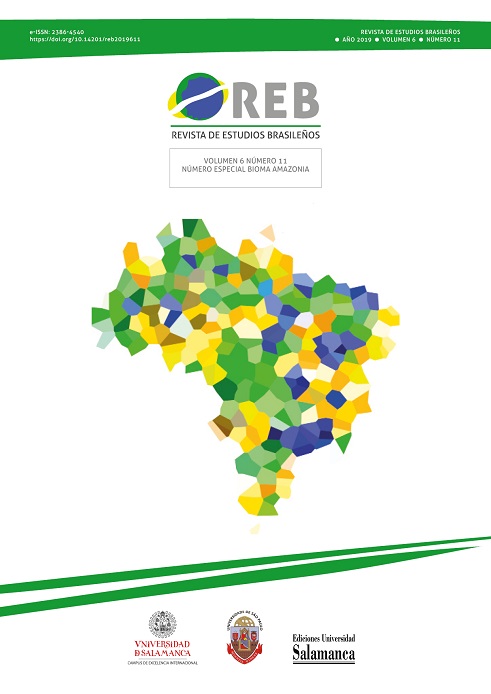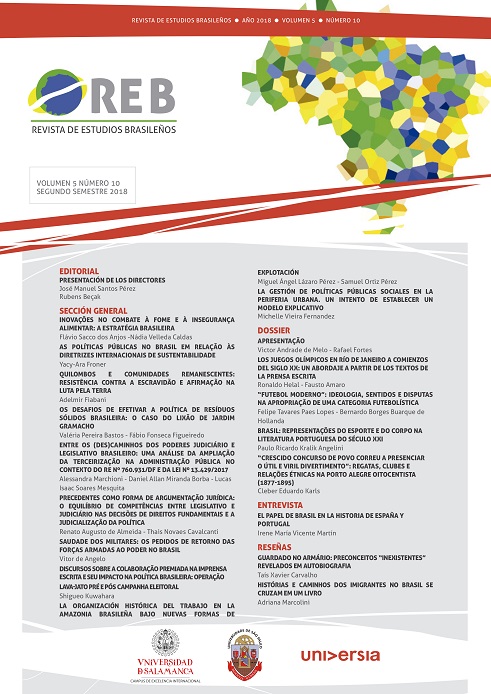Archives
-
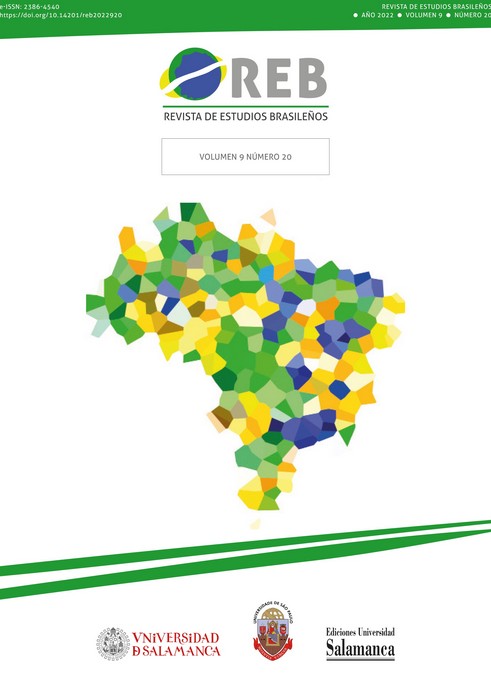
Second Semester 2022
Vol. 9 No. 20 (2022)The Revista de Estudios Brasileños reaches its 20th issue and does so in an important year, the Bicentennial of Brazilian Independence. This special anniversary could not be ignored by the journal and the content of the Dossier is dedicated to it. The dossier is coordinated by the current director of the Centro de Estudios Brasileños, professor at the University of Salamanca, and specialist in Brazilian History, José Manuel Santos. In the section were published six articles from authors from different universities and different countries, who analyze some aspects of the roots of current Brazil, Independence itself, and the first problems to be addressed by the new State.
This issue is completed with three attractive interviews. The first one is with Stuart B. Schwartz. This Yale’s professor is probably one of the most recognized and influential specialists among historians of colonial Brazil. The second interview is with the professor and researcher at USP, Prof. Amancio Jorge de Oliveira, vice director of the Ipiranga Museum, in the occasion of the reopening of the institution, one of the most significant events of the Bicentennial, which can be valued as a success, as it makes it possible to relive this significant moment of Brazil's Independence. In the last interview, Prof. Pedro Dallari (USP) interviews Rubens Ricupero, responsible, in 2022, for the José Bonifácio Chair, of the Institute of International Relations (IRI, USP), whose research topic was the Bicentennial of Independence from Brazil.
All that makes this news issue of the Revista de Estudios Brasilñeos particularly interesting for those who wants to know more about the past or present of Brazil.
-
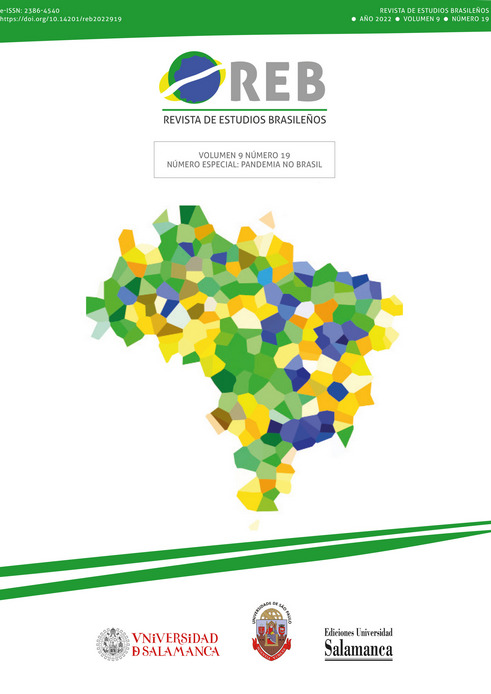
Special Issue Pandemic in Brazil
Vol. 9 No. 19 (2022)The theme of this special issue of Revista de Estudios Brasileños, from the Center for Brazilian Studies at the Universidad de Salamanca, deals with the impacts and management of the COVID-19 pandemic in Brazil.
-
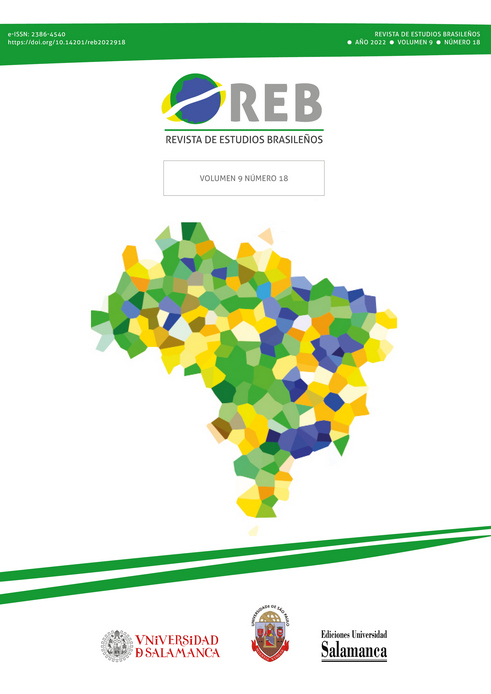
First Semester 2022
Vol. 9 No. 18 (2022)This issue we present now corresponds to the first volume of the year 2022. The journal brings together a total of nine articles in the General Section that, as always, analyze different aspects of the Brazilian reality. Education and indigenous culture, as well as public policies for the Brazilian Amazon region once again occupy several pages of this publication, highlighting the relevance of the topic for Brazilian present moment. The Dossier is dedicated to a subject very dear to the USAL: the teaching and learning of Spanish, in this case, focused on the Brazilian reality. The section was coordinated by professors Andréia Roder Carmona-Ramires (Universidade Estadual do Paraná, UEPR, Brazil) and Odair Luiz Nadin (Universidade Estadual Paulista, Unesp, Brazil), responsible for selecting the material that we now offer to our readers. In addition to the section presentation article (signed by the coordinators), the Dossier includes the articles of Marcella Nascimento Fernandes and Letícia Coroa do Couto, about the experience of carrying out an extension course dedicated to Spanish for Specific Purposes. Next, we have the article by Graziellen Gelli Pinheiro Lima, which presents an analysis of the Spanish course programs in the federal universities of the Brazilian Northeast; and, closing the section, the work of Glória de Fátima Pinotti de Assumpção, who contributes with a discussion technique about the teaching of Terminology in Technical Vocational Education of Secondary Level. To finish, we would like to greatly appreciate the contribution of all the authors, collaborators and all the professionals who have directly or indirectly contributed to the preparation of this issue that we finally publish.
We wish all readers enjoy reading.
-
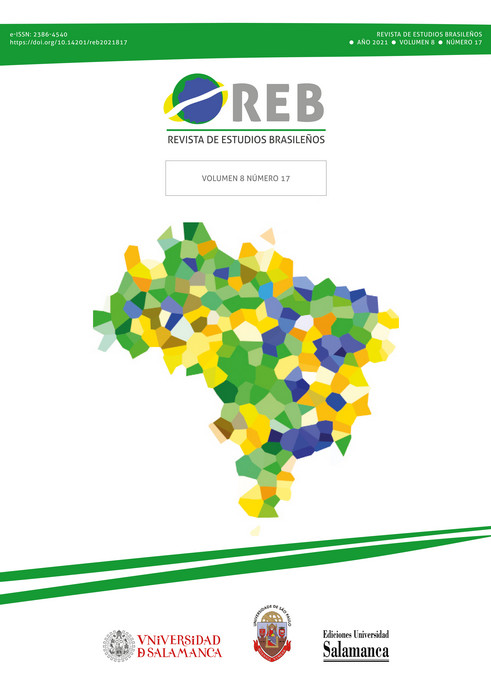
Second Semester 2021
Vol. 8 No. 17 (2021)In 2001, the Universidad de Salamanca created the Centro de Estudios Brasileños, with the aim of promoting academic and exchange relations between the University and Brazilian Higher Education institutions. Since then, the CEB has had the collaboration of the Embassy of Brazil in Madrid, the Junta de Castilla y León and the Fundación Cultural Hispano-Brasileña, among many other national and international academic and cultural institutions.
The Revista de Estudios Brasileños, created in 2014, is one of the initiatives promoted by the CEB, as part of its commitment to academic cooperation and scientific dissemination about Brazil. And for this, the collaboration with the University of São Paulo is decisive, in the sense of strengthening the dialogue for the dissemination of knowledge about Brazil and the internationalization of the University and this Center.
In this sense, the reader of this issue will find, in the "Varia" section, the article entitled "Twenty years later", which tells the history of the institution, illustrated by a set of photographs that collect some important moments of the history of CEB. As in all issues, the REB publishes in the "General Section" articles that address different topics on Brazil, maintaining the plurality of content and analytical approaches. The "Dossier" brings together seven articles that, from different perspectives, address the issue of sustainable development in Brazil. The studies gathered in the section analyze some consequences of the pandemic in Brazil, the possibilities of tourism as a practice for regional development, photovoltaic energy, solid waste treatment, the importance of a sustainable urbanization process and the Brazilian environmental policy in comparative perspective.
This issue also includes an interview conducted by Prof. Ascensión Rivas Hernández to the Brazilian writer, academic and member of our Advisory Council, Ana Maria Machado. The writer was honored at the second edition of the International Congress of Brazilian Literature, which the CEB organizes every two years, in collaboration with the Brazilian Academy of Letters. In the interview, Ana Maria Machado talks about her work as a writer and her doctorate under the supervision of Roland Barthes.
Finally, in this issue, Ignacio Berdugo (co-director of the REB since 2022), signs an article on the challenges of international criminal law in the Brazilian Amazon. We cannot finish this presentation without thanking enormously the contribution of all the authors, collaborators, reviewers and all the professionals who have worked so that this number has finally seen the light.
We wish you all a happy reading.
-
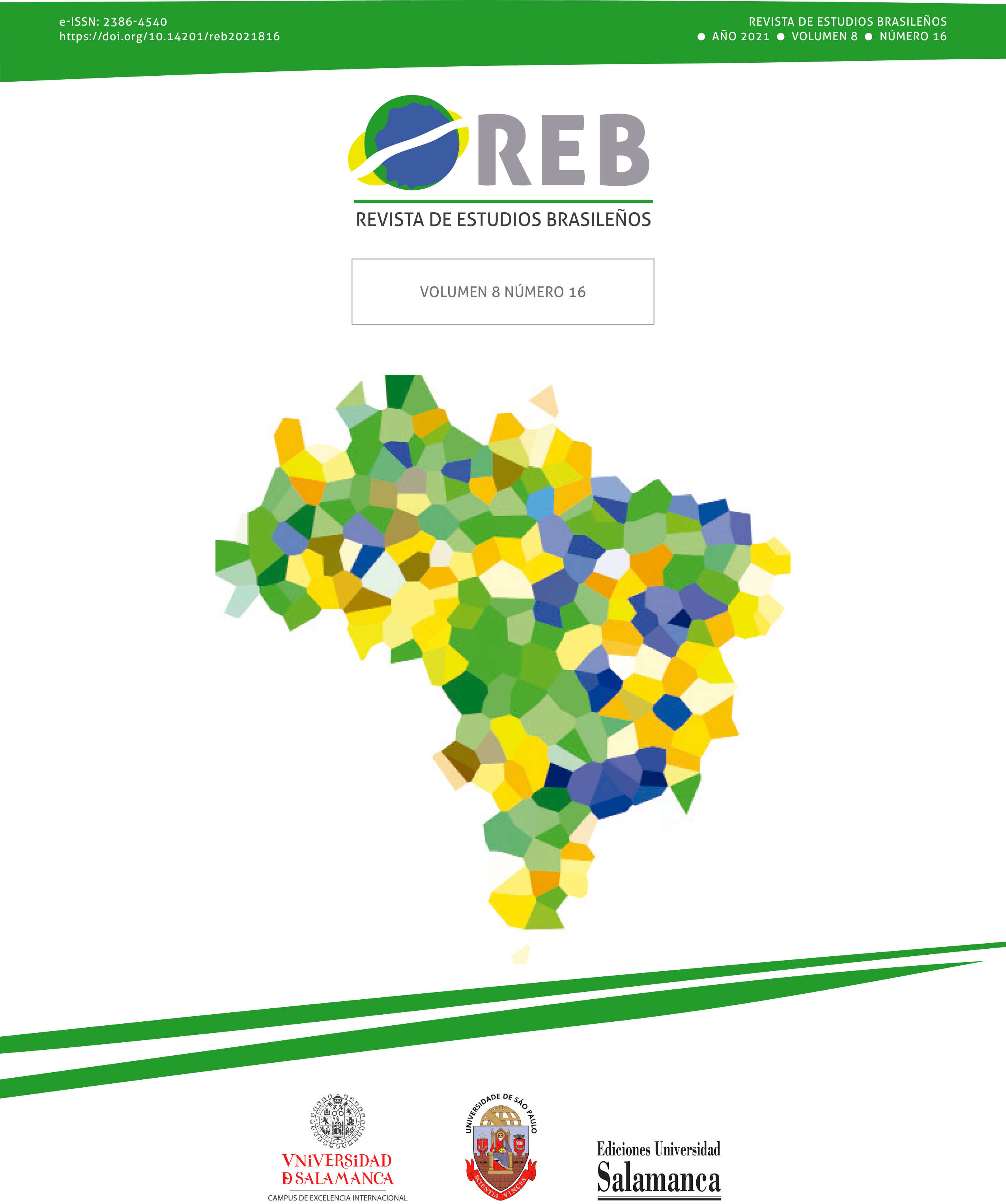
Vol. 8 No. 16 (2021)
En la segunda parte del año 2020 y a inicios del presente 2021, la pandemia de COVID-19 causada por el virus Sars-Cov-2 ha seguido creciendo a un ritmo alarmante, alcanzando a todos los lugares del planeta y causando estragos en todos los continentes. Dos de los países más afectados, si bien con diferentes respuestas ante el problema, han sido España y Brasil, en los que se edita esta Revista. La variada reacción de las autoridades brasileñas, con confinamientos puntuales y de escasa efectividad, ha causado que la enfermedad se extendiera muy rápidamente en los meses finales de 2020 y en los primeros días de 2021. La situación se ha vuelto crítica en muchas ciudades, fundamentalmente en Manaos, donde una supuesta inmunidad de rebaño no fue suficiente para contener una nueva ola que, según los virólogos, corresponde a una nueva cepa del virus, la denominada “variante brasileña”. La expansión de esta variante ha provocado una restricción a escala global de las comunicaciones aéreas con Brasil, con el resultado de que en estos momentos tengamos el nivel más bajo de contactos entre este país y España/Europa de los últimos 20 años. A nadie se le escapa la gravedad de estos hechos y el impacto que tienen y tendrán en las relaciones internacionales y en los intercambios económicos, sociales o académicos entre nuestros países. Afortunadamente, las campañas de vacunación han comenzado, aunque avanzan a ritmos muy diferentes en las diferentes regiones y estados. Una mirada objetiva demuestra que Brasil tiene bajos datos de vacunación por millón de habitantes, aunque los cambios en el ministerio de Sanidad, con relevo del anterior ministro, dan a entender que hay un empeño por modificar la situación y acelerar el ritmo de vacunación. La Revista de Estudios Brasileños quiere expresar su solidaridad y sentimientos de pésame a las familias y allegados de las víctimas que esta terrible enfermedad está causando. Con este número 16 la REB continúa y reafirma su compromiso con la difusión de la investigación realizada en y sobre Brasil.
Feliz lectura.
-
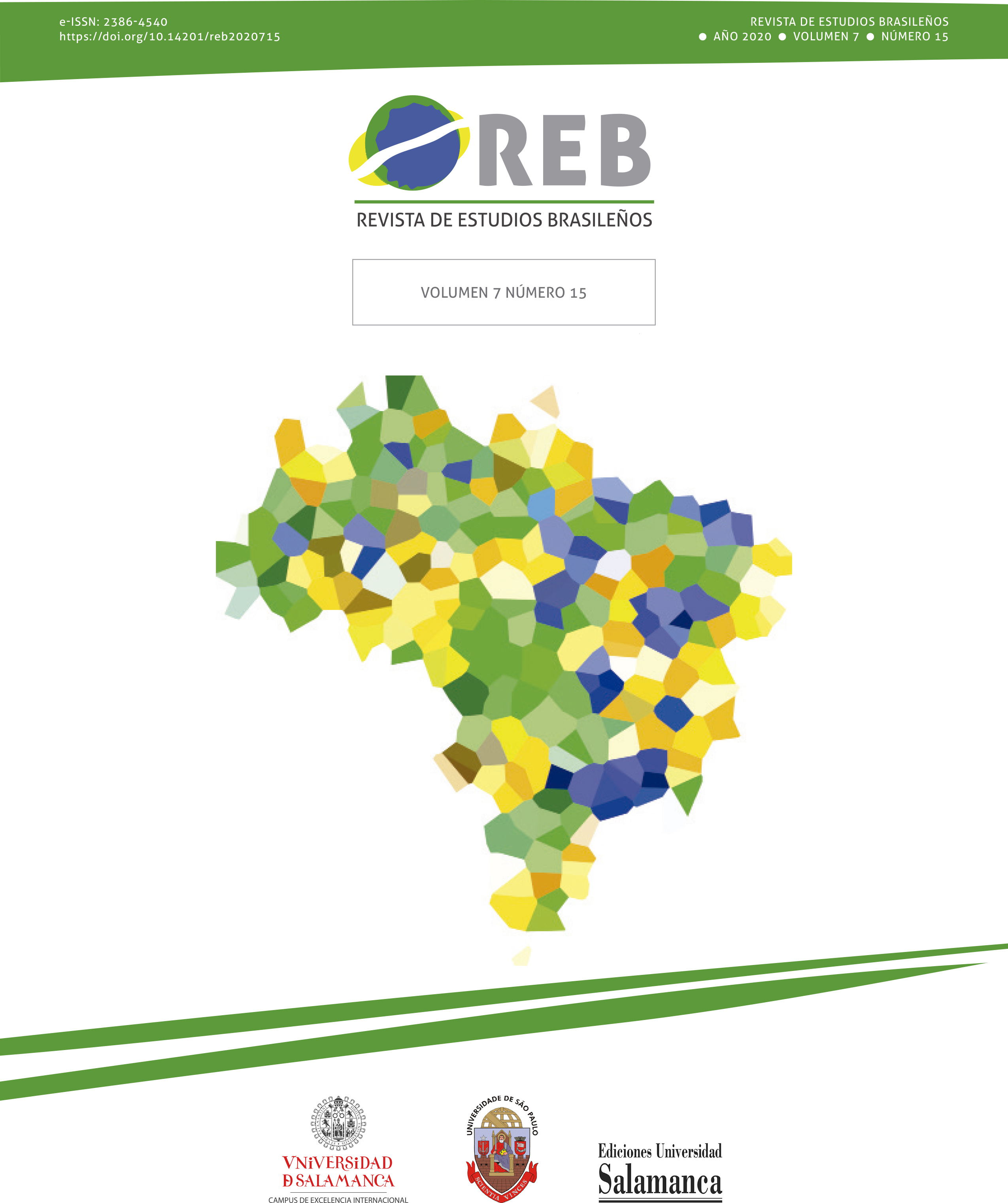
Vol. 7 No. 15 (2020)
We reached number 15 of our Revista de Estudios Brasileños. It is an achievement to celebrate and for several reasons. In the first place, the constant publication of our editions, bringing the best to deal with in the presentation of issues related to Brazil, in the perspective of the academic-scientific dialogue proposed at the time of its foundation. It was a feat to do this at a time of extreme crisis in the publishing sector, not only caused by the global economic crisis, but, above all, by the specific perspective of the market, with huge competition with other media. Last but not least, there was also the unprecedented crisis caused by the Covid-19 pandemic, with the worldwide enactment of restrictions of various types, including lockdowns, all of which made it difficult to maintain the regularity of editorial publications. We can therefore say that we have won. We managed to close the editorial cycle of the year 2020, with this emblematic issue, within our expected regularity of editions, carried out with Ediciones Universidad de Salamanca, with the always noted quality put in the endeavor. The quality of the articles and reviews brought speaks for itself. In this issue, the dossier is dedicated to the Brazilian Amazon, coordinated by professors Raimunda Nonata Monteiro (UFOPA, Brazil), Enaile do Espírito Santo Iadanza (UnB, Brazil) and Helena Maria Martins Lastres (UFRJ, Brazil). In the interview section, we have two very interesting ones, namely, that with Bruno Ayllón Pino, a politologist and specialist in Brazilian international relations, conducted by José Manuel Santos Pérez and Elisa Tavares Duarte, co-director and editor of REB respectively, and the one made with Fernanda Viegas Reichadt, collaborator of the Institute for Advanced Studies at USP, about the panorama of indigenous lands in the face of the Covid-19 pandemic, conducted by Caio Rodrigo Albuquerque, journalist at USP's “Luiz de Queiroz” School of Agriculture. We are sure that, once again, we have fulfilled the objective that has guided our REB since its foundation: to offer first-rate literary material and provoke reflections and considerations of magnitude on the studies it proposes. Happy reading to all!
-
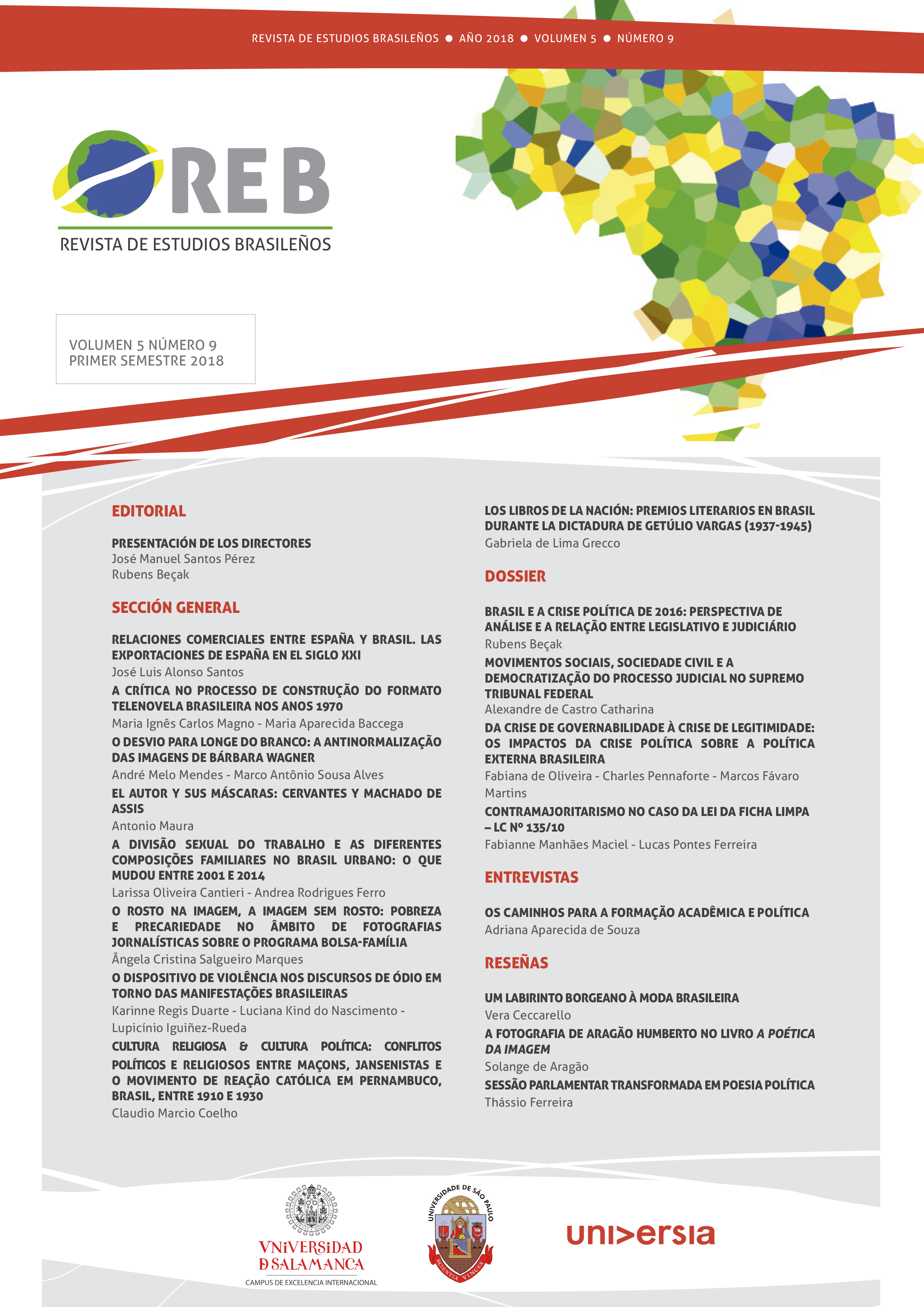
Vol. 5 No. 9 (2018)
The Revista de Estudios Brasileños (Journal of Brazilian Studies) publishes the ninth issue in its fifth year of editorial life, with the full consolidation of the project and a large acceptance by authors and readers. During the last few years, Brazil has experienced some of the most intense moments of its recent history, such as the organization of the World Cup, the Olympic Games in Rio de Janeiro and, in political terms, the impeachment process of President Dilma Rousseff in 2016. All these events were observed by a perplexed society, which saw the country moving from an intense collective euphoria during the last years of Lula's government and the first term of Dilma's to a feeling of deep economic, political and social crisis, whose solution cannot be foreseen and which, as a roller coaster, has led Brazilians from an exacerbated optimism to a sensation of defeat, asceticism and disaffection towards the political system and its ruling elites. Corruption cases have contributed greatly to this feeling, which, although common in Western democracies in the first two decades of the 21st century, acquires in Brazil a special dimension both for its strategic importance as well as for the depth and intensity of this unstable period.
-
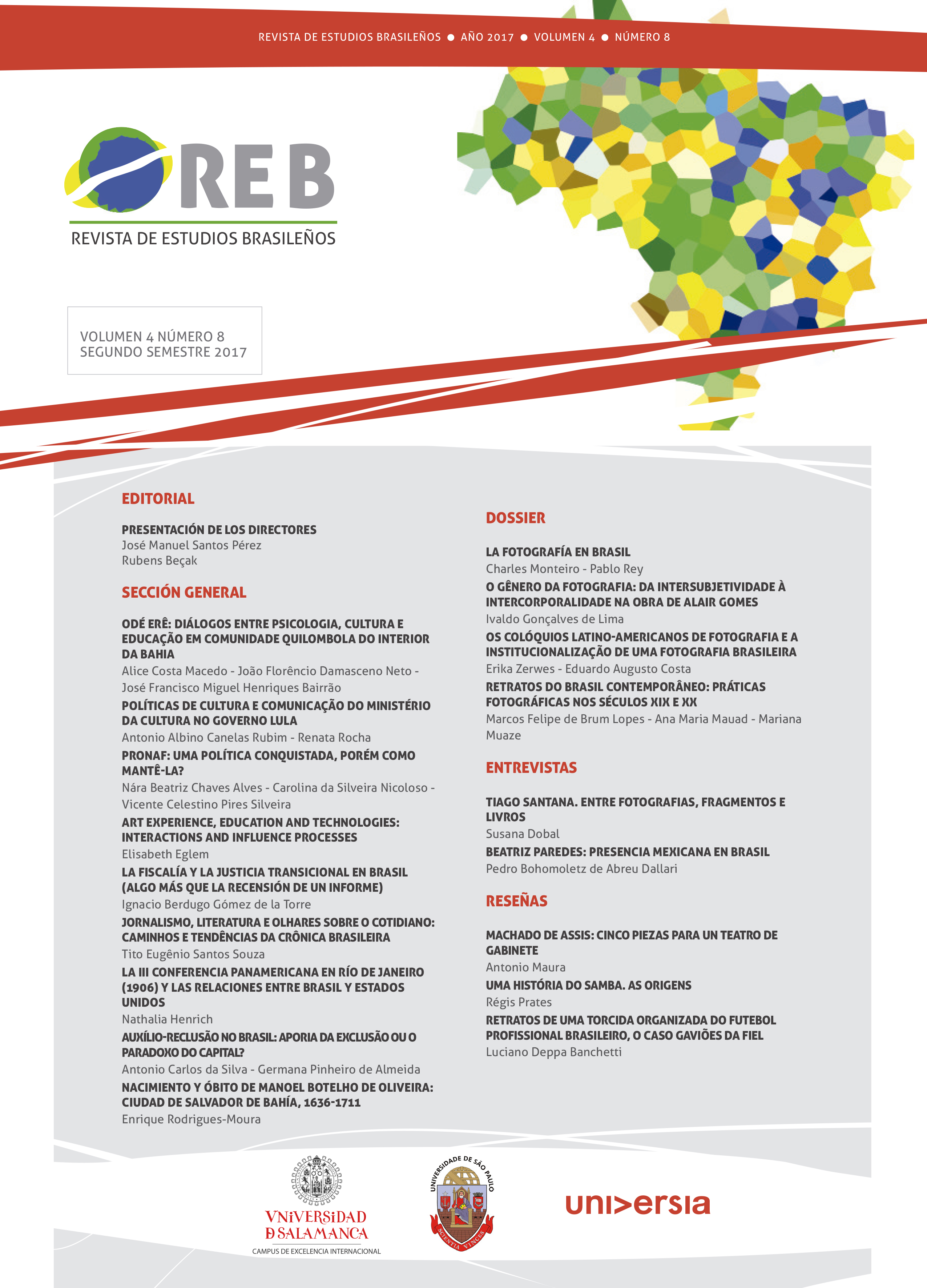
Vol. 4 No. 8 (2017)
With great joy comes the Revista de Estudio Brasileños to its eighth issue! A feat that should be celebrated and which demonstrates that the goals set at the time of its launch were and remain successful. The knowledge of what is important in Brazilian affairs, with the special treatment and dissemination of the editorial are a deserving celebration. -

Special Issue Brazilian cinema CIHALCEP 2017
Vol. 4 No. 7 (2017)Special issue dedicated to the Brazilian cinema, organized in collaboration with the IV Congreso Internacional de Historia, Arte e Literatura en el Cine en Español y Portugués (CIHALCEP 2017), of the Centro de Estudios Brasileños of Salamanca`s University, that took place in Salamanca, between June 28th and 30th 2017. -

Vol. 4 No. 6 (2017)
This issue presents as “Dossier`s” theme “Una aproximación al conocimiento del territorio brasileño y a sus relaciones con España”, coordinated by Professor Valentín Cabero, professor of Geography at the University of Salamanca, who also conducted an interview with Professor George Gurgel, from the Federal University of Bahia, who was deeply knowledgeable about the reality of sustainable development in Brazil.
The Revista de Estudos Brasileños, in this way, contributes in its number 6 to the great debate that occurs on a global scale, and more concretely in Brazil, on the environmental challenge that humanity has raised and whose resolution will be vital for a development Stable and durable in the coming years.
The number 6 also publishes in its “General Section” texts of varied topics ranging from academic mobility between Spain and Brazil in recent years, the specificities of the Brazilian statistical system, coalition presidentialism or public policies of education in the vision Of young political activists.
-

Vol. 3 No. 5 (2016)
The Revista de Estudios Brasileños presents its fifth number in its third year of publishing life. Over the years, the REB had the invaluable collaboration of authors, reviewers, proofreaders and, in particular, readers that allowed the magazine to be consolidated as a reference in the dissemination of scientific knowledge produced in and about Brazil.
In this issue, the "Dossier", "Education" in Brazil, was coordinated by Professors Carlos Alexandre Netto and Maria Beatriz Luce, both from the Federal University of Rio Grande do Sul (Brazil). The current Brazilian context and past experiences in the field of Education imposed the choice of the theme and its consequences: the discussion on secularity, sexuality and curriculum, training for employment and memory, and finally the process of internalization of higher education institutions.
In the "Interview" section, the director of the Revista de Estudios Brasileños and Professor at the University of Salamanca, José Manuel Santos Pérez, spoke with the historian Laura de Mello e Souza, a Professor at the Paris IV University - Sorbonne.
We appreciate all the people who contributed to this issue publication and we take opportunity to reaffirm our commitment to disclosure and disseminate scientific knowledge about Brazil.
-

Vol. 3 No. 4 (2016)
The magazine Brazilian Studies reaches its third year of publishing life with this No. 4 , while maintaining the commitment to act as a "knowledge bridge" between the countries involved, to do justice to the long tradition of Spanish-Brazilian cooperation, especially, the dissemination of scientific and academic diversity and affirming so, step by step, as refereed journal.
-

Vol. 2 No. 3 (2015)
The magazine Brazilian Studies released its number 3 edition, leaving behind the embryonic stage, consolidating itself as a reference for specialized studies about Brazil in different areas of knowledge. And it does it in a big way: We released a special issue in which the National commission of truth, that has given its final report to President Dilma Rousseff on December 2014, is the biggest protagonist. On the other hand, the director of the Brazilian Study Center from Salamanca’s university, Professor. Dr. Ignacio Berdugo has interviewed the professor from São Paulo Law University, Dr. Pedro Dallari, who is the commission coordinator and responsible for the final report. On the other hand, professor Dallari coordinates the dossier fully devoted to the military period containing articles from José Almino de Alencar, Vivien Ishaq and André Saboia Martins.
-
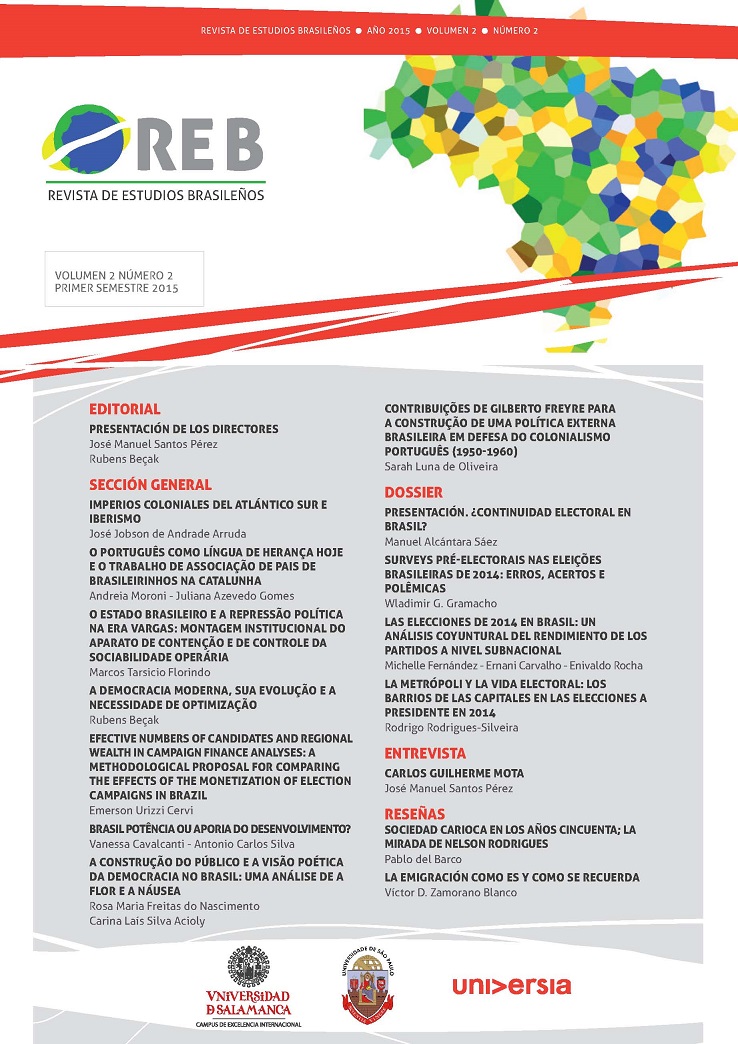
Vol. 2 No. 2 (2015)
This issue of the Journal of Brazilian Studies (REB) highlights in particular the 2014 elections in Brazil. The Dossier was coordinated by Dr. Manuel Alcántara, Professor of Political Science of the University of Salamanca. In its eagerness to approach the different aspects of Brazilian reality, REB also contains in this issue articles addressing matters in Economics, History, Language, Literature and other areas, in addition to an interview with the Emeritus Professor of History from the Universidade de São Paulo, Carlos Guilherme Mota, and a section of reviews and news. The call for papers put out in October was received with such enthusiasm that we were forced to make a selection from the many submissions. We are quite proud and thankful for the interest in REB that authors have shown.
-

Vol. 1 No. 1 (2014)
Internationalization is a characteristic of our society, impinging on politics, culture, economic affairs and education. In fact, there is no single aspect of society that is not governed or at least influenced by this phenomenon.
Universities must react to this current world trend through internationalization policies, which should not be limited to student exchanges or relations between researchers –which are by the way bountiful- but must also pass through institutional relations and the detection of the identifying features of other countries. Gaining in-depth insight into the cultures and knowledge of other realities is an indication of the quality of a university, since such cultures and knowledge help to train professionals in all spheres of human endeavour, and these professionals will therefore be better able to carry out their professional activities in a globalized world.
The Revista de Estudios Brasileños reflects the commitment of three institutions to the challenges currently faced by universities. These are the Universities of Salamanca and Sao Paolo, emblematic in their respective countries, and Universia, which represents the new technologies in the service of Higher Education institutions throughout Latin America.

